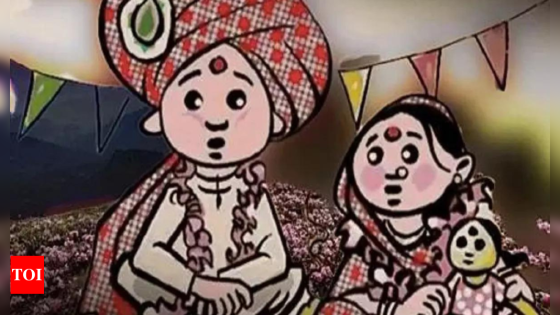NEW DELHI: A data analysis from 265 districts in 17 states/UTs shows out of 9,551 child marriages stopped or prevented through legal interventions by a coalition of civil society organisations in 2022-23, nearly 60% girls were in 15 to 18-year age group.
The data highlights vulnerability of even younger girls as it shows 26% of girls whose marriages were prevented were between 10 and 14.Girls of 9 years and below accounted for 0.6% cases. Top four states where child marriages were stopped are Bihar (31%), Bengal (11%), UP (11%) and Jharkhand (10%). Compiled by Child Marriage Free India Campaign, a coalition of 161 civil society bodies, data shows it was able to prevent 59,364 child marriages.
Bengal tops states where child marriage FIRs registered
In 9,551 child marriage cases, legal interventions such as registration of FIR, injunction orders by courts, orders by child welfare committees and undertakings in presence of govt officials have been initiated. Remaining 49,813 child marriages were stopped through counselling of parents and awareness programmes. West Bengal (32%) and Bihar (7%) figured among top five states along with Assam (27%), Odisha (8%) and Maharashtra (6%) where FIRs were registered.
The data is drawn from ‘Educate To End Child Marriage’, a research paper prepared by coalition calls, for expanding the ambit of Right to Education Act 2009 to provide free and compulsory education from classes 9 to 12. The research paper drives home the point by drawing from National Family Health – 5 (2019-21) to highlight that states with higher female literacy rates tend to have lower prevalence rates of child marriage.
According to the report, in southern zone, Kerala stands out with a high female literacy rate of 96% and a low child marriage prevalence of 6%. Similarly, Mizoram in north-east shows a high female literacy rate of 93% and a relatively low child marriage prevalence of 8%.
Conversely, Bihar in eastern zone have a low female literacy rate of 61% and a high child marriage prevalence of 41%. And, Rajasthan in north zone has a lower female literacy rate of 64% and a relatively high child marriage prevalence of 25%.
The data highlights vulnerability of even younger girls as it shows 26% of girls whose marriages were prevented were between 10 and 14.Girls of 9 years and below accounted for 0.6% cases. Top four states where child marriages were stopped are Bihar (31%), Bengal (11%), UP (11%) and Jharkhand (10%). Compiled by Child Marriage Free India Campaign, a coalition of 161 civil society bodies, data shows it was able to prevent 59,364 child marriages.
Bengal tops states where child marriage FIRs registered
In 9,551 child marriage cases, legal interventions such as registration of FIR, injunction orders by courts, orders by child welfare committees and undertakings in presence of govt officials have been initiated. Remaining 49,813 child marriages were stopped through counselling of parents and awareness programmes. West Bengal (32%) and Bihar (7%) figured among top five states along with Assam (27%), Odisha (8%) and Maharashtra (6%) where FIRs were registered.
The data is drawn from ‘Educate To End Child Marriage’, a research paper prepared by coalition calls, for expanding the ambit of Right to Education Act 2009 to provide free and compulsory education from classes 9 to 12. The research paper drives home the point by drawing from National Family Health – 5 (2019-21) to highlight that states with higher female literacy rates tend to have lower prevalence rates of child marriage.
According to the report, in southern zone, Kerala stands out with a high female literacy rate of 96% and a low child marriage prevalence of 6%. Similarly, Mizoram in north-east shows a high female literacy rate of 93% and a relatively low child marriage prevalence of 8%.
Conversely, Bihar in eastern zone have a low female literacy rate of 61% and a high child marriage prevalence of 41%. And, Rajasthan in north zone has a lower female literacy rate of 64% and a relatively high child marriage prevalence of 25%.
Source Agencies



